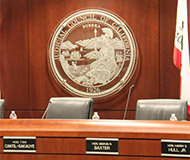Article from: www.thenewspaper.com/news/70/7042.asp
5/5/2021
Are Red Light Camera Tickets Now Optional In California?
A California court case reduced, or possibly eliminated, consequences for ignoring a mailed red light camera citation.
 Payment of red light camera tickets is entirely optional in a number of states. A Tennessee lawmaker proved the point by burning his own automated citation on a live video while explaining the lack of consequences for nonpayment. In the Golden State, a handful of individual court systems, such as the Los Angeles County Superior Court, decided a decade ago not to prosecute non-payment. As collections dried up, the city of Los Angeles and 19 other jurisdictions within the county ended their photo enforcement programs.
Payment of red light camera tickets is entirely optional in a number of states. A Tennessee lawmaker proved the point by burning his own automated citation on a live video while explaining the lack of consequences for nonpayment. In the Golden State, a handful of individual court systems, such as the Los Angeles County Superior Court, decided a decade ago not to prosecute non-payment. As collections dried up, the city of Los Angeles and 19 other jurisdictions within the county ended their photo enforcement programs.
Recent legal developments suggest motorists throughout California may now have the same freedom to discard automated citations without being penalized. The state Department of Motor Vehicles (DMV) changed its policy and will no longer suspend driver's licenses over failure to pay those $500 red light camera tickets that arrive in the mail.
"Since Governor Edmund G. Brown Jr signed Assembly Bill 103 into law on June 27, 2017, DMV no longer accepts failure to pay notices from courts and cannot suspend or withhold a driver license for that reason," the DMV website states. "If you fail to pay a ticket fine or court fees, the DMV will not suspend or withhold your driver license or make a notation on your driver record. However, you are still obligated to pay your fines or fees to the court."
At the beginning of the year, the DMV restored nearly half a million licenses that had been suspended over unpaid traffic tickets. California had seen a record 4.2 million licenses suspended between 2006 and 2013, and the state claimed unpaid traffic ticket debt had reached $9.7 billion by 2016. Lawsuits over suspensions compelled changes in the law, DMV procedures and court procedures. In a June 2020 decision, the California Court of Appeal ruled the DMV was violating the law by suspending licenses without proof that the driver "willfully violated his or her written promise to appear." A driver who receives a ticket in the mail has made no such promise.
"An order to appear in court is not equivalent to a written promise to appear," Judge Mark B. Simons wrote for the three-judge appellate panel. "The Judicial Council form for an automated traffic enforcement system notice to appear contains no box for a person to sign a written promise. Thus the court can easily determine, based on the record before it, whether a written promise to appear was made." (Read the court ruling in a ![]() 150k PDF file.)
150k PDF file.)
Automated ticketing companies do hire law firms to threatening letters to vehicle owners who have ignored their automated citations. Since 2016, however, these letters have had no teeth. As a result of an unrelated nationwide court settlement, the three major credit reporting agencies agreed to stop considering or recording unpaid tickets, meaning credit ratings would no longer be affected by unpaid citations (view settlement details). The 2017 statute also prohibits the issuance of arrest warrants for failure to appear on these sorts of alleged violations.
"The legislative history is unequivocal that the bill's purpose was to cut down arrest warrants which are issued for traffic infractions," Judge Simons noted.
It is unclear whether the courts will attempt to take other action against photo ticket recipients. The state Assembly Transportation Committee responded last week by unanimously approving Assembly Bill 550, which would authorize the use of speed cameras while also taking photo radar tickets out of the hands of the court system. The new photo radar fines would become "civil penalties" of up to $500 that would be challenged in an administrative hearing run by the city agency that issued the ticket. Motorists would not be able to appeal that decision in superior court without paying a newly imposed fee for access to the court.
Cities like Pasadena experimented with photo radar in the late 1980s, but the program was quickly dropped because of public opposition.
 Payment of red light camera tickets is entirely optional in a number of states. A Tennessee lawmaker proved the point by burning his own automated citation on a live video while explaining the lack of consequences for nonpayment. In the Golden State, a handful of individual court systems, such as the Los Angeles County Superior Court, decided a decade ago not to prosecute non-payment. As collections dried up, the city of Los Angeles and 19 other jurisdictions within the county ended their photo enforcement programs.
Payment of red light camera tickets is entirely optional in a number of states. A Tennessee lawmaker proved the point by burning his own automated citation on a live video while explaining the lack of consequences for nonpayment. In the Golden State, a handful of individual court systems, such as the Los Angeles County Superior Court, decided a decade ago not to prosecute non-payment. As collections dried up, the city of Los Angeles and 19 other jurisdictions within the county ended their photo enforcement programs.